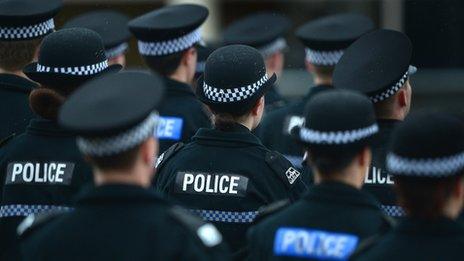Police Scotland stopped and searched thousands of children
- Published
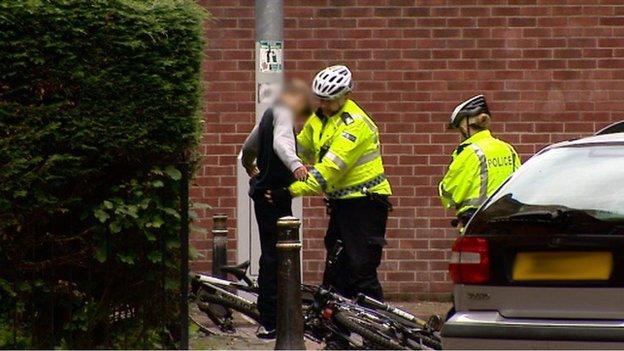
Police say the stop and search policy has led to a reduction in violent crime and antisocial disorder
Police Scotland stopped and searched thousands of children between the ages of eight and 12 last year, according to data obtained by BBC Scotland.
Officers carried out 2,912 searches on children in that age group between April and December 2013.
The figures were revealed ahead of the Scottish Police Authority publishing a review of the stop and search tactic.
Police Scotland said the tactic had contributed to a reduction in violence and anti-social behaviour
The force said a total of 640,699 searches were carried out across the 12 months to the end of March.
The figure is three times higher than the 222,315 searches conducted by London's Metropolitan force, which polices a population greater than that of Scotland.
You can explore all the stop and search data using the SEARCHABLE DATABASE, external developed by BBC Scotland.
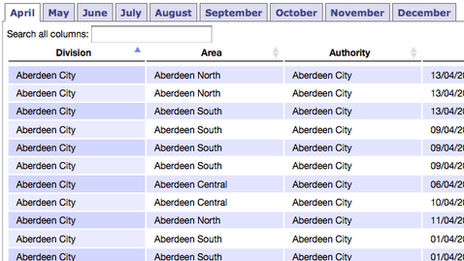
BBC Scotland has created a searchable database of the stop and search data
The SPA has recommended Police Scotland should review its policy on stop and search. The force has set up a new unit to draw up guidelines and monitor its practices to ensure the tactic is employed in the same way across the country.
The Scottish Police Authority has been reviewing the data since January to assess the effectiveness of the tactic, which allows officers to search people for drugs, alcohol, stolen goods and weapons.
The figures obtained by BBC Scotland, through a Freedom of Information request, showed that about 16% of the searches involving children in the eight to 12 age group yielded positive results.
Force watchdog
Of these, 79% were consensual, where the child searched agreed to be searched and an officer did not require reasonable suspicion.
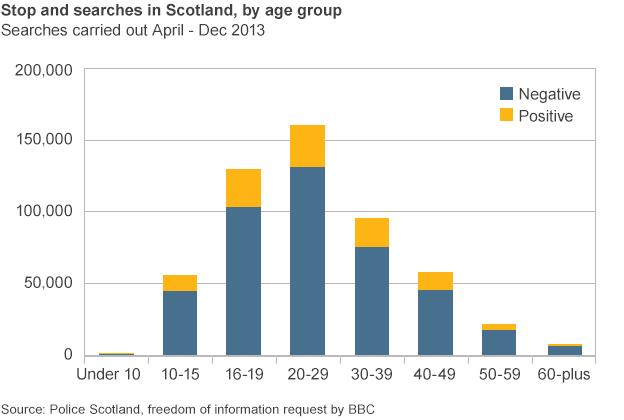
Among young people, 16-year-olds were most commonly stopped (38,132), followed by 17-year-olds (32,409).
The figures also showed people in Glasgow were more than 10 times as likely to be stopped and searched by police than those in Aberdeen.
There were 3,027 searches per 10,000 people in Glasgow City compared with 297 searches per 10,000 people in Aberdeen.
There appeared to be no targeting of ethnic minorities in police stop and searches, with most involving Caucasian males.
The data, for April to December, also revealed:
A quarter of all 519,213 stop and searches yielded positive results
70% of all searches were consensual
Searches were made for drugs (220,786), alcohol (167,730) and weapons (84,756)
The most searches were conducted in Greater Glasgow (201,558), Ayrshire (82,501) and Lanarkshire (81,584)
The most searches (69,837) were conducted in August 2013
A single officer was responsible for conducting 949 searches
84% of searches were conducted on males
Searches also resulted in the discovery of more unusual items such as wildlife (40) and fireworks (1,252).
Informed consent
The review of stop and search comes in the wake of Home Secretary Theresa May announcing an overhaul of the practice in England and Wales over concerns searches were used too widely and targeted ethnic minorities.
The tactic was most prevalent in the old Strathclyde Police area, but has been extended nationwide following the creation of the new Police Scotland force.
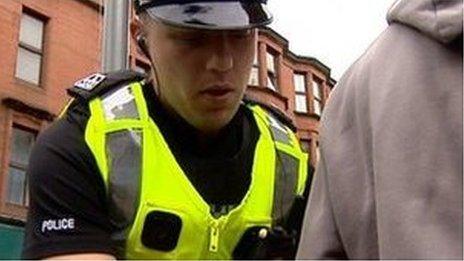
Officers carried out more than half a million searches for drugs, alcohol, stolen goods and weapons
The SPA review said it was difficult to find a rationale for the roll-out of stop and search throughout Scotland.
Authority member Brian Barbour said: "Our primary conclusion is that stop-and-search as a tactic does contribute to a reduction in violence and reducing anti-social behaviour, but the extent of that contribution is unknown.
"We could find no causal link between the reduction in violence and the volume of stop-and-search activity."
He added: "There are questions around proportionality and consistency of approach in the age profile of those searched, particularly those under 24, over 80 and indeed under 10s where it is questionable why children under 10 would be searched on a non-statutory basis."
Scotland's Children's Commissioner Tam Baillie said it was wrong that children and young people were being subjected to stop and search on such a large scale.
He said: "They account for over 30% of all searches in Scotland and the vast majority are non-statutory.
This high incidence is concerning and is discriminatory. I am very disturbed that a substantial number of children aged nine or under are being subjected to stop and search.
"There is no justification for this practice being used on children under eight years old, as they cannot give informed consent and are below the age of criminal responsibility."
'Intelligence-led'
Police Scotland Chief Constable Stephen House said stop and search "has contributed to violence and anti-social behaviour reductions across Scotland".
However, he accepted that "processes and communications can and should be improved".
He added: "We will take all appropriate steps to ensure that stop and search is carried out as part of our engagement with the public, to detect weapons, drugs and alcohol and to deter people from carrying these in the future.
"We will also ensure that it is done in an intelligence-led way with respect for the rights of individuals so that the public have confidence and trust in the policing service that we offer.
"While I am confident that we have gone a considerable way to strengthen our stop and search procedures, the recommendations we have just heard contained in the report provide an opportunity for us to further address concerns and to review, develop and improve our processes and communications even more.
The Scottish government said stop and search was "one important tool police use to prevent and detect crime and protect citizens and communities".
A spokesman added: "The use of stop and search contributes to the fact that crime is at an almost 40 year low, violent crime has fallen by half since 2007, homicides at their lowest rate since records began and crimes of handling an offensive weapon are down by 60 per cent since 2006/07.
"We will continue to make sure the people of Scotland get the best policing possible and today's SPA report is a welcome contribution to this."
Speaking ahead of the publication of the SPA's review, Scottish Liberal Democrat justice spokesperson Alison McInnes MSP said there had been "an explosion" in the number of stop and searches.
"The majority have very little legal basis, are carried out without intelligence or suspicion, and are not properly recorded," she said.
- Published29 May 2014
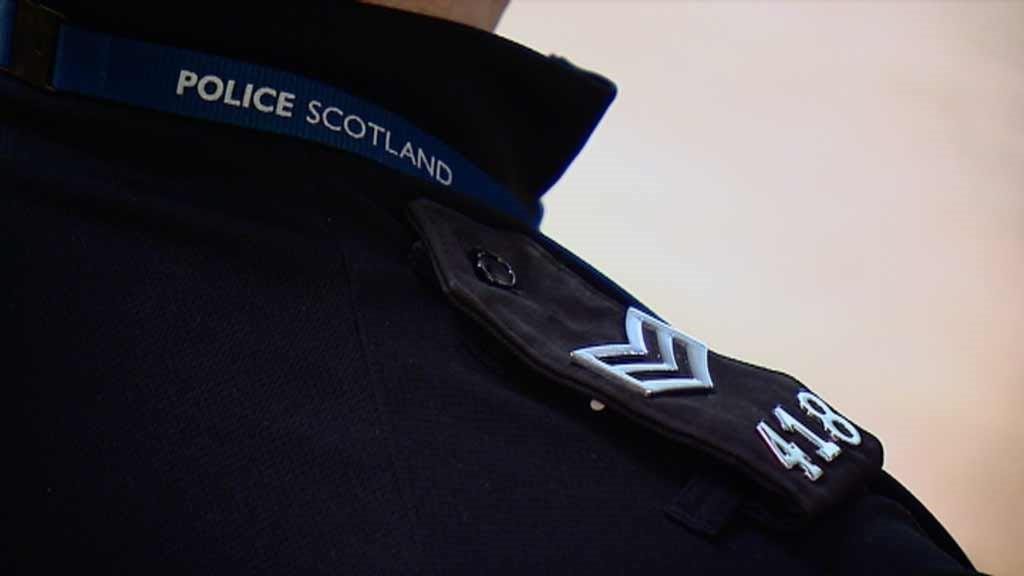
- Published17 January 2014
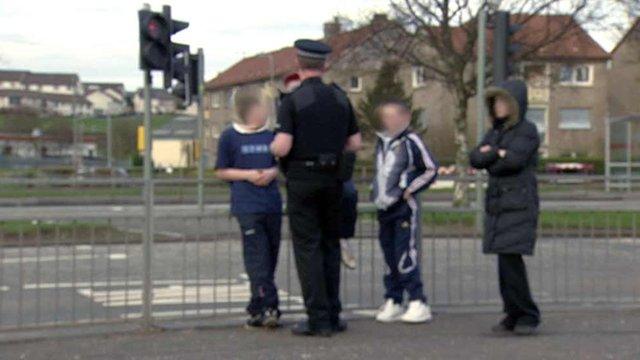
- Published15 January 2014
